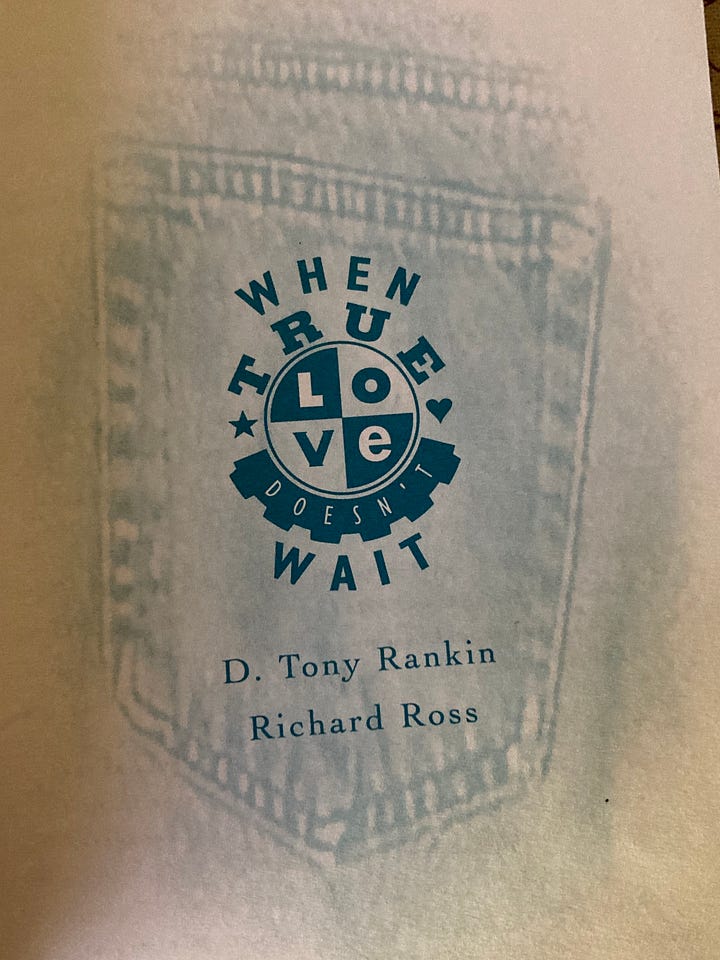How True Love Waits Enables a Culture of Abuse in the Southern Baptist Convention
An Excerpt from After Purity: Race, Sex, and Religion in White Christian America Forthcoming from Beacon Press
In the early 1990s the Southern Baptist Convention introduced its purity campaign True Love Waits to the youth and youth ministers of the denomination. Within two years, they would boast over 2 million adherents to sexual purity before marriage. The roll-out was intentionally grandiose, calling Christ-following teenagers to live a pure and holy life free of guilt, shame, and romantic disappointment. Striving for sexual purity became a moral mandate, mapped onto the adolescent believer’s path to salvation, a path fraught with the dangers of secular temptation, physical pleasure, and immediate gratification.
TLW framed themselves as an oasis, a refuge for adolescents from the threats of secular life. It characterized church life as a community with the highest of moral expectations, but equally secure support systems to protect and accompany young people on their passage to adulthood, i.e. heterosexual, Christian marriage. TLW and Evangelical purity culture as a whole provided a clear demarcation: The secular world is fraught with sexual danger and heartbreak. Our world is blessed with sexual safety and the promise of true love.
The emergence of Evangelical purity culture (and its meteoric rise to national prominence) was as a means by which white Evangelicals sought and maintained political power. A moral panic fueled by HIV-AIDS and teen pregnancy made groups like TLW appear almost avant-garde in their retro-grade approach to human sexuality. The assurance of sexual safety appealed to adults, while the promise emotional and sexual fulfillment enticed the young. Purity culture was a haven, the realization of the Evangelical desire to be “set apart” from secular life and safe from the threats therein.
Purity campaigns increased the political presence for Evangelicalism and its male leadership. It originated in the same decade that fundamentalist leaders reinstated authoritarianism and gender hierarchies at all SBC institutions. When understood in conjunction with the fundamentalist take-over in the denomination, True Love Waits was developed to socialize young men and women into a culture of female submission and male authority. Lacking any commitment to female empowerment and gender equality, purity campaigns became the staging ground for sexual abuse and institutional neglect toward women and girls.
The SBC moved TLW forward with extravagant national displays, rolling out a plan for international impact, including an inaugural display of over 200,00 pledge cards on the lawn of the National Mall in Washington D.C. SBC youth and other Evangelical adolescents reported for duty in droves. They proclaimed themselves to be exemplars—sexually pure bodies representing the innocence of both a church body and the body politic. Given what else would transpire in the decades to come, the guttural force of the SBC’s TLW campaign is striking.
[Description: Over 200,000 True Love Waits pledged cards inserted into the lawn of the National Mall (Capital Building in background) by teenagers attending DC 94 sponsored by Youth for Christ and TLW. A select group of young Southern Baptists led by Richard Ross would later meet with President Bill Clinton to lobby for increased funding for abstinence-only education. Though the contingent left disappointed, the SBC later influenced congress to include funding for abstinence-only education which would be added to Clinton 1996 Welfare Reform Bill]
______________________
In 2018, the Houston Chronicle published a series of articles detailing two decades of clergy sex abuse within the SBC along with the denomination’s inability to address the problem. The SBC claimed they had limited ability to do so because of the denomination’s congregationalist structure. Local churches remain autonomous, with no central church structure that would allow the denomination to keep a list of ppl who were charged with any form of sexual misconduct, they claimed. While organizational structures, policies, and practices are complex, it should be mentioned that despite the de-centralization of their ecclesiastical structure, the SBC had little problem growing TLW into an international movement with significant political and social influence at the very same time that the denomination was failing to protect its young people from sexual predators.
The one place where TLW attempted to address the issue of sexual assault offers insight into how purity teachings promote a culture of abuse. A tiny publication authored by Ross and Tony Rankin entitled When True Love Doesn’t Wait is the only source published by the organization that addresses the topic. The small pamphlet first argues that sex is always a danger that needs to be controlled, thereby placing the burden of responsibility on young people learning to navigate their own sexual desire. "You probably know that sex before marriage breaks God's law and is a serious sin. You may honestly wonder what the future holds for someone who could do such a thing." Sex before marriage, Ross and Rankin claim, is a catastrophic event on par with violent acts and natural disasters. "Once a person has been through a tornado, fire, shooting or sexual experience, a memory is created." Adolescents who have positive sexual experiences are encouraged to reframe them as harmful. Sex goes from being a curiosity to a natural disaster. If sex before marriage is always a disaster, how do young people learn to recognize when they are experiencing real harm?


The authors also ascribe destructive behaviors such as drug and alcohol use to adolescent sexual guilt. "Guilty teenagers give up completely, exercise some method of escape: drugs, sex alcohol, or withdrawal from life." Ross and Rankin fail to see that the “dangerous behaviors” they describe can also be efforts to cope with various forms of trauma. Instead of inquiring as the the actual causes for destructive adolescent behavior, they explain it in spiritual terms: guilt accrued from disobeying God’s command not to have sex outside of marriage. In doing so they encourage church leaders to misidentify trauma responses (including sexual trauma) as sinful behavior the wayward adolescent must repent for.
The authoritarian logic of True Love Waits adheres to the patterns of institutional abuse studied by scholars and survivor advocates. According to Stephanie Kriebhel and Hillary Jerome Scarsella of Into Account, an advocacy organization for survivors of sexual assault in religious communities, Christian theological teachings can and do promote cultures of abuse. Sexual abuse is both deeply personal and embedded in institutional norms. Christian theologies that valorize suffering, service, and obedience create a culture in which the value and worth of individuals is based on their ability to comply with these signifiers of Christian piety. These same theologies become a sinister force in the life of abuse survivors who struggle to regain safety and self-worth.
True Love Waits does assure its young readers that being forced to have sex does not mean loss of virginity. Valorizing virginity, Ross and Rankin offer it as a spiritual gift for supposedly helping survivors recover from their assault. Then they go on to say this, “Reporting (your assault) immediately will increase your believability. (Emphasis mine.) Unfortunately, some persons use this excuse once they've been caught, find out someone is pregnant, or discover an STD. Your reason for reporting is not to get the other person in trouble."
This paragraph offers insight into how TLW and the SBC think about survivorship and why the denomination has failed to treat survivors of clergy sex abuse with the respect and compassion they deserve. The pamphlet offers a check list for “good survivors” to follow IF they want to be believed and taken seriously. The assumption being, if you do not follow these directives your experiences can be dismissed and we will conclude you are committing libel against your brother in Christ. The solution they offer is not to hold perpetrators accountable, but to follow their instructions so that the powers that be can determine if a survivor’s allegations are true or a cover for their own sinful behavior. Their assertions set up a jurisdictional system biased against survivors and in favor of institutional power.
Purity culture already promotes the belief that young men and women experience sexual desire in radically different ways: men overwhelmed by aggressive lust need to be kept in check by women who are naturally disposed toward sexual passivity. Coupled with the idea that rape survivors lodge accusations as a cover for their own guilt, True Love Waits normalizes what we have come to call rape culture, a set of deeply misogynistic beliefs and practices that undermine the ability of survivors to seek and receive justice and healing.
Ross, Rankin and every youth minister who endorses sexual purity will claim they have always done so out of love for young people and their spiritual thriving. They claim that sexual purity is an effort to protect young people from harmful relationships and self-hatred. But reading their words and seeing how little they understand about sexual survivorship, I’m left wondering: what did they know? Did they know of the proliferation of sexual abusers in the church? Did they know they needed a way to address it without drawing attention to the failures of the institution? What if the purpose of TLW was to make the vulnerable population feel responsible for their own sexual well-being in hopes they could better defend themselves from sexual predators? I don’t have the answer to these questions and I suspect many in the SBC would throw me under the same bus they use to flatten survivors. But advocating for survivors requires digging into the depths of the un-thinkable, something the SBC leadership has been unwilling to do and they still haven’t explained why.




